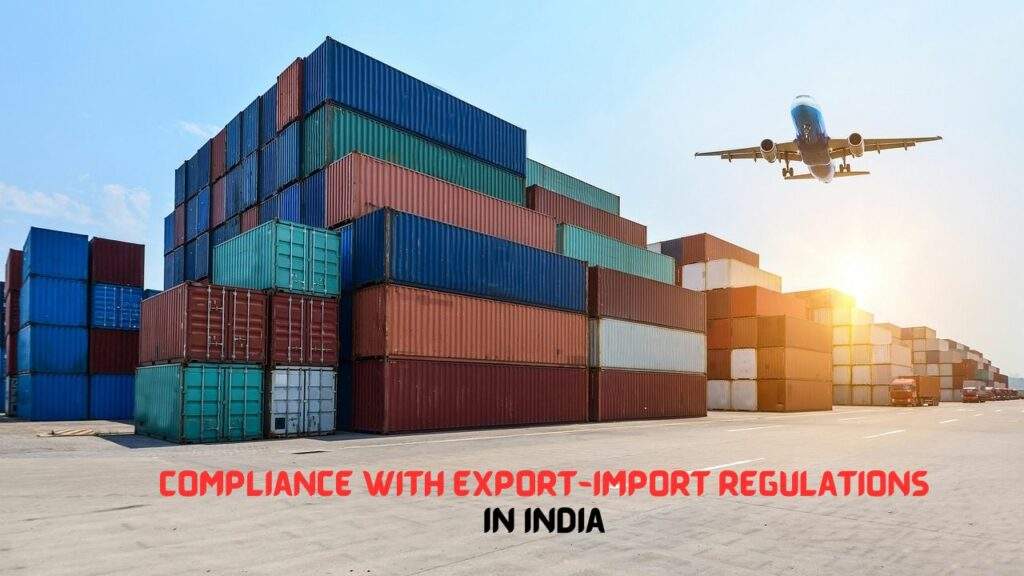

Export-import regulations in India types of activities are vital drivers of a country’s economy, because they contribute significantly to trade, job creation, and overall economic growth.
In India, a country known for its diverse and dynamic trade landscape, complying with export-import regulations is crucial for businesses and the government to maintain smooth and lawful trade practices.
Navigating the intricate web of regulations can be daunting, but with the proper knowledge and strategies, businesses can ensure compliance and reap the benefits of international trade.
Join us while we explore the world of compliance with Export-Import regulations in India.
Knowing about the Export-import Regulations in India
India’s export-import regulations are primarily governed by various government bodies and statutes, including the Directorate General of Foreign Trade (DGFT), the Reserve Bank of India (RBI), the Customs Department, and the Foreign Exchange Management Act (FEMA).
The Foreign Trade Policy (FTP) outlines the general guidelines and regulations for exports and imports, while the Harmonized System of Nomenclature (HSN) classifies products for tariff purposes. Familiarity with these bodies and acts is the first step towards ensuring compliance.
It is also necessary to have an EPCG scheme to ensure smooth business key process movement.
Key Steps to Ensure Compliance with Export-Import Regulations in India
Following are some of the most important steps for compliance with export-import regulations in India:
Obtaining an Importer-Exporter Code (IEC)
The IEC, issued by the DGFT, is a requirement for businesses engaging in export or import activities. It is a unique 10-digit code that facilitates cross-border transactions. Businesses must apply for an IEC online and ensure its accurate declaration in all relevant documents.
Understanding Product Classification
Accurate classification of products using the HSN code is crucial. This code determines customs duties, export incentives, and restrictions. Misclassification can lead to delays, penalties, or even confiscation of goods.
Customs Compliance
Complying with customs regulations is fundamental. Documentation must be accurate and complete, including the Bill of Entry or Shipping Bill. Duty calculations, valuation, and adhering to any specific regulations related to prohibited or restricted items are essential.
Adhering to Export Controls
Certain items, such as defence equipment or specific technologies, require export licences. Businesses must thoroughly research and apply for necessary permits before engaging in such transactions.
Foreign Exchange Management
RBI guidelines dictate the financial aspects of export-import transactions, including the mode of payment, repatriation of funds, and managing foreign exchange risk. Adherence to FEMA regulations is critical for hassle-free transactions.
Quality and Standards
Many products need to meet specific quality standards to be exported or imported. Obtaining necessary certifications from relevant bodies ensures compliance with quality norms and eliminates the risk of rejection at the destination.
Utilising Export Incentives
The Indian government offers various export incentives and schemes to promote international trade. Schemes like the Merchandise Exports from India Scheme (MEIS) and Services Exports from India Scheme (SEIS) offer benefits based on specific criteria. Businesses should leverage these incentives to boost competitiveness.
Managing Documentation
Export-import transactions involve a multitude of documents such as invoices, packing lists, certificates of origin, and insurance documents. Maintaining accurate and organised documentation streamlines the process and avoids delays.
Best Practices for Compliance with Export-import Regulations in India
Follow the practises given below to always ensure your business complies with the regulations in India.
Stay Updated with Export-Import Guidelines
Export-import regulations are subject to change. Regularly monitoring updates from the DGFT, RBI, and other relevant authorities is vital to remain compliant.
Training and Education
Businesses should invest in training programs for their staff to ensure a clear understanding of regulations and their implications. This helps in avoiding inadvertent violations.
Engage Professionals
For complex transactions or when dealing with unfamiliar regulations, seeking advice from customs brokers, legal experts, or consultants specialising in international trade can be beneficial.
Internal Controls
Establishing robust internal controls helps in monitoring compliance and preventing violations. This includes pre-shipment and post-shipment inspections to validate documentation accuracy.
Risk Management
Understand and assess the risks associated with export-import transactions, including financial, regulatory, and geopolitical risks. Implement risk mitigation strategies to safeguard your business interests.
Ethical Practices
Adhering to ethical business practices enhances your reputation and reduces the likelihood of legal complications.
Conclusion
Ensuring compliance with export-import regulations in India is a multifaceted endeavour that requires thorough understanding, diligent adherence, and continuous vigilance.
By comprehending the regulatory framework, implementing best practices, and staying updated on changes, businesses can navigate the complexities of international trade successfully.
Compliance not only safeguards businesses from legal consequences but also fosters trust with partners and opens the doors to profitable global opportunities.